N. Gemini Sasson's Blog, page 13
November 15, 2011
Imperfect Heroes: Archer Hamilton
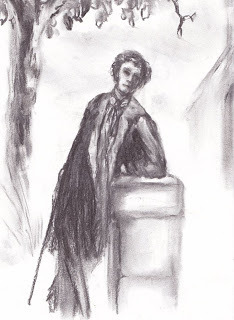 (Artwork credit: B. Lloyd)
(Artwork credit: B. Lloyd)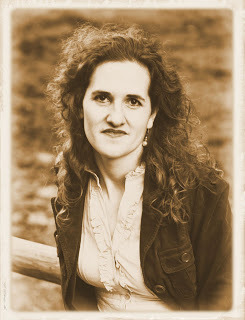
Today, novelist V.R. Christensen is jumping in and telling us about her Imperfect Hero: Archer Hamilton from her book, Of Moths and Butterflies.
Blurb:
Archer Hamilton is a collector of rare and beautiful insects. Gina Shaw is a servant in his uncle's house. Clearly out of place in the position in which she has been discovered, she becomes a source of fascination . . . and curiosity.
A girl with a blighted past and a fortune she deems a curse, Gina has lowered herself in order to find escape from her family and their scheming designs. But when she is found, the stakes suddenly become dire.
All Gina wants is the freedom to live her life as she would wish. All her aunts want is the money that comes with her. But there is more than one way to trap an insect. An arranged marriage might turn out profitable for more parties than one.
Mr. Hamilton is about to make the acquisition of a lifetime. But will the price be worth it? Can a woman captured and acquired learn to love the man who has bought her?*****
"Perfect people are boring. I cannot understand them (because I don't know any, myself) and I cannot sympathise with them. I do, however, have a deep appreciation for those who strive to be good, despite their weaknesses, despite their downfalls. A hero who is too good is unbelievable, and yet...one that is too flawed...well, they are difficult to root for. It's hard to find that balance.
I acquired, several years ago, a very battered collection of George Meredith's works, and I've been trying to read my way through them. He writes such amazing women, strong and good, if sometimes rebellious, which I like. That was quite a flaw in the Victorian era, female independence, you know. And his heroes? They are equally flawed. Perhaps more so. Richard Feverel (The Ordeal of Richard Feverel) for example is too obedient and it becomes a tragic flaw. And yet you follow him with rapt fascination toward and into that tragedy. Evan Harrinton, on the other hand, is what they call a 'managed man'. His elder sister tells him what to do and where to go and whom to love and what to make of his life. And for the most part he does it. And when he doesn't want to do it, he wallows around feeling sorry for himself and wondering why he cannot get up the gumption to stand up to her. I found him difficult to sympathise with. Perhaps because I'm a woman with a fiercely independent spirit. But it is, nevertheless, a truism that those who must fight for what they want appreciate it most, while those by nature blessed rarely take full advantage of their opportunities. At any rate, Evan was a difficult book to engage in.
And so I knew, when it came time for me to write of my own 'managed man' that I had to walk a fine line.
Archer Hamilton is young and he has much of youthful ambition and willfulness about him. And yet he doesn't always use these to the best effect. He is controlled, manipulated by his uncle who has raised him, and who has raised him to believe he will inherit...if he observes his duty. And chiefest of his duties is to marry a fortune. This is all well enough until he meets the unfortunate Miss Shaw, who he later learns is a servant in his uncle's house. He cannot marry her, and yet he is irresistibly drawn to her. He considers, and very seriously, breaking with his uncle over the matter, but then...he has no money of his own. He is powerless.
Miss Shaw, as it turns out, is not the penniless misfortunate she would like people to believe her, and when it is discovered she's actually the unwilling beneficiary of a sizable fortune, Archer's uncle arranges their marriage. Archer does not object, in fact quite the reverse, but the blessing of having the woman he wants comes with an enormous price. He is now his uncle's puppet. Sir Edmund has seized the money and taken control of everything, and Archer is helpless now to do anything for himself. Neither has he the respect of his wife. And without this, perhaps the most important thing of all, he has nothing.
Archer is not entirely without strengths, however. From his mother he learned the value of earning the love and respect of others, which has been his primary motivation in remaining loyal to his uncle. Sir Edmund might, should Archer manage to please him, be the father he never had. More than anything, though, he must grow up, something he has so far not bee required to do, with everything he's ever needed handed to him on a plate. He learns, and quickly, the value of worthwhile loyalty, and that family pride, money, tradition, the opinion of the masses, these mean nothing when you have not the love and respect of those most important to you. For these he learns to fight, whatever the cost.
As a work entirely fictional, it seems, and perhaps is, an impossible story. And yet there are parallels to modern life. The book is about the various forms of abuse, mostly (though not entirely) psychological, and about the barriers we allow to be placed in the paths to our own success and happiness. Those barriers are most often the direct results of our own flaws and weaknesses. We may blame them on circumstance or on others, but we always have a choice what we will do with the obstacles placed before us, and, too, with the opportunities. Sometimes they are not, after all, entirely different.
I am a champion of the underdog, of the honestly flawed. To have weaknesses and to be honest about them speaks of a person who is trying to do and be better, rather than pretending to be something he is not. I cannot help but respect that. It's true we have too few heroes in this world, but I'll take a flawed hero over a perfect one any day."
(Thanks so much V.R.!)
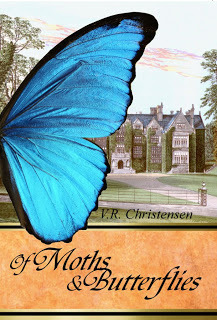
V.R. Christensen's web site
Blog
Of Moths and Butterflies is available at:
Amazon.com
Barnes and Noble
Smashwords
Happy reading,
Gemi

Published on November 15, 2011 11:00
November 10, 2011
Imperfect Heroes: James Douglas
 In the coming month, I'll be featuring some Imperfect Heroes from fellow historical novelists. These are the guys who tip the scales, rise victorious from conflict and (hopefully) get the girl in the end, but they aren't without their flaws.
In the coming month, I'll be featuring some Imperfect Heroes from fellow historical novelists. These are the guys who tip the scales, rise victorious from conflict and (hopefully) get the girl in the end, but they aren't without their flaws.We could discuss the (exemplary) archetypal hero vs. the (contrary) antihero, but what about those protagonists who fall somewhere in between? As in reality, literary persona run the gradient of good and bad traits. For those of you who have read Bernard Cornwell's Saxon Tales, Uhtred Uhtredson of Bebbenburg, on first impression, is about as antihero as you can get. He's cynical, ruthless, and far from being the romantic type. But over the course of the stories, you see a clear pattern evolve - he keeps his word, he's courageous and he's more than willing to take action to get what he wants. And that makes him admirable.
Perfect heroes are boring. Let's face it - Prince Charming is very one dimensional. He's handsome, he's rich and his kiss alone can wake Sleeping Beauty from a seemingly interminable coma. All very convenient for our wilting maiden, but in fairy tales like that, it's external circumstances, not the characters themselves, that need to be overcome for a happy ending.
As we get older, we come to realize perfect people don't exist. And in real life, happy endings aren't always guaranteed. We can identify with flawed characters. We feel their angst, understand their fears. We root for them. Cheer when they succeed. Mourn when they fail.
When I started to write The Bruce Trilogy, the first chapter I put down was about ten-year old James Douglas, standing on the parapets of Berwick at his father's side, witnessing the assault on the castle and subsequent massacre led by the ruthless Edward I (Longshanks) of England. That event - the atrocities and his father's humbling submission - determined his life's path. It filled him with the want for retribution, hatred for his enemies, and the determination to put things right in the only way he knew how - by force of arms. Unfortunately, being so young then, he could only bide his time. How serendipitous that when he finally came of age, Robert the Bruce was making a bid for the crown of Scotland. He became King Robert's most loyal soldier and, renowned for his cunning and stealth, was given command at a young age.
Perfect? Hardly. He was right for the role he played in Scotland's history, but as a man he was an imperfect being. What few descriptions we have of him are that he spoke with a lisp and then not often. One gets the impression that he was shy with words, maybe even a little uncomfortable in social situations with the opposite sex, even though his male friendships were like Super-Glue bonds. I focused a lot on this awkwardness in The Honor Due a King, where his reticence keeps the woman he loves at bay, and his loyalty conflicts, more than once, with winning his life's love. Even as I was writing him, I kept wanting to grab him by the collar and say, "Speak up, man! How is anyone supposed to know how you feel if you keep pushing it back down inside you and denying it? You deserve her. Go for it, will you?"
In time, his loyalty and thirst for revenge became traits that even he began to question. Numerous times he recaptured, ruined and even razed his own boyhood home, Douglas Castle, because he did not want the English to have it.
As for the girl - well, I won't tell you if he gets her in the end. You'll have to read the book to find out.
P.S. The guy on the cover of The Bruce Trilogy books - that's James Douglas. But if you've been thinking all along that it's Robert the Bruce, please continue to do so.
Happy reading,
Gemi

Published on November 10, 2011 14:31
October 19, 2011
Giveaway for The Bruce Trilogy over at Musings of a Book Junkie
If you still need to catch up on reading The Bruce Trilogy, Allison over at Musings of a Book Junkie is hosting a giveaway for one copy of a book from the series (The Crown in the Heather, Worth Dying For or The Honor Due a King), your choice of either Kindle or paperback (and yes, international entries are fine). Contest deadline is November 1st - so hurry over and add your name and contact info.!
To enter, click here.
Meanwhile, The Honor Due a King has stealthily found its way into the Top 100 for Historical Fiction on Kindle and I'm spending my days in 14th century England, working on the sequel to Isabeau. My desk is being overrun by research books, highlighters and Post-It notes.
Happy reading,
Gemi

To enter, click here.
Meanwhile, The Honor Due a King has stealthily found its way into the Top 100 for Historical Fiction on Kindle and I'm spending my days in 14th century England, working on the sequel to Isabeau. My desk is being overrun by research books, highlighters and Post-It notes.
Happy reading,
Gemi

Published on October 19, 2011 07:24
October 10, 2011
Razing castles
Hi All!
I'm guest blogging over at Sarah Woodbury's on razing castles in the 14th century. Follow me over there and check out Sarah's incredible blog, filled with historical articles!
Best,
Gemi

I'm guest blogging over at Sarah Woodbury's on razing castles in the 14th century. Follow me over there and check out Sarah's incredible blog, filled with historical articles!
Best,
Gemi

Published on October 10, 2011 10:39
October 5, 2011
The Honor Due a King (The Bruce Trilogy: Book III)
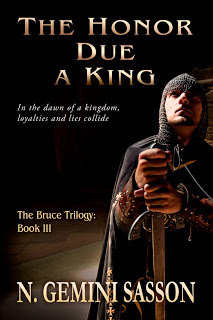
It's been a marathon week and as evidence to that, it's nearly noon and I'm still in yesterday's clothes. I just finished a backlog mountain of laundry at midnight last night and the grass has grown a foot since last mowing.
The end result is that the final installment in The Bruce Trilogy, The Honor Due a King, is now available as an e-book at Amazon.com, Amazon.co.uk, and Smashwords (for Nook, Ipad, Sony and Kobo). I'll post here again when it's directly available from Barnes and Noble, etc. The paperback should be available on Amazon well before the end of the month.
As I caught up this morning with e-mails from readers to let them know about the new release, I realized how the interest has snowballed over the past year and I got a little... misty. It's been a challenging year, both frustrating and rewarding in turns. But nothing worth doing is ever easy. So whatever your dreams and goals are - go for them! There are people out there who like to squash dreams by criticizing, dismissing or talking bad about you. Forget about them. As Oprah says: "Surround yourself with angels."
Now, here's the blurb for The Honor Due a King:
In the dawn of a kingdom, loyalties and lies collide.
The truth will change England and Scotland forever.
In the triumphant aftermath of Bannockburn, Robert the Bruce faces unfamiliar battles. His wife Elizabeth, held captive in England for eight long years, has finally returned home to Scotland. With his marriage in ruin and hopes for an heir quickly fading, Robert vows to fulfill an oath from long ago—one which will not only bind his daughter to a man she does not love, but challenge the honor of his most trusted knight, James Douglas.
While Ireland falls to the Scots, King Edward II of England must contend with quarrelsome barons. Hugh Despenser is the one man who can give him both the loyalty and love he so desperately craves. War with France looms and Edward's only chance at peace rests with his queen, Isabella—a woman who has every reason to seek her own revenge.
Tormented by his past, James returns to a solitary, ruthless life of raiding into the north of England. When a bewitching spy promises him the ultimate victory, James must weigh whether to unveil the truth and risk losing her love—or guard his secrets and forever preserve Robert's faith in him.
Happy reading,
Gemi

Published on October 05, 2011 08:54
September 29, 2011
Goldilocks and the Three Books
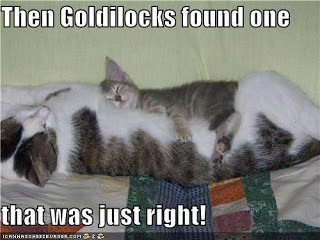
Imagine Goldilocks rumbling through the Three Bears' house. She's bored and in need of something to read. She flips through the family-shared Kindle (because bears are too poor to afford multiple e-readers):
1) Finds a Stephen King book: "This is too scary!"
2) Opens a Nicholas Sparks book: "This is too mushy!"
3) Discovers Carl Sagan's Cosmos buried in a collection: "Now this is just right!"
After filling her tummy with Mueslix (hey, they may be poor bears, but they're health-conscious), and sipping some chamomile tea while trying out the different recliners, she finds herself getting nappy and looks for a place to sack out. Shortly after which the bears walk in and---
(Okay, that story needed to be brought into the 21 century, but I digress...)
*****
After a long night flopping around on my bed because the springs were digging into my bones and waking up more tired than when I went to sleep, I figured it was time for a new mattress. I've been contemplating one of those squishy memory foam ones. The Tempurpedic commercials have infiltrated my brain, you see. So of course I posed the question to my buddies on Facebook (because, next to Google and Wikipedia, that's the best place to gather collective wisdom).
Opinions ranged wildly. From "Love mine!" to "I felt like I was being swallowed by a marshmallow." After having my neck readjusted because I ended up sleeping with my head craned at an impossible angle towards my left shoulder one night, my osteopath said mattresses are an entirely individual matter. Just go with what's comfortable to you.
This made all too much sense. Heck, my husband thinks the firm support of the floor provides a restful night's sleep. Yeah, and I used to think it'd be a blast to be on Survivor until I realized that after sleeping on a bamboo mat on the ground for a few days I'd probably be so sleep-deprived that I'd go postal. Then after getting voted off because I couldn't cooperate with the resident Svengali, I'd watch the show and see myself muttering unintelligibly and wonder who that person who was wearing my face and clothes and using my name.
I'm still undecided on the mattress issue, but it made me think of how individual a lot of choices are. What's perfect to one person is anathema to another. And books, because they often provoke strong emotions, are a prime example of why we can all have distinct reactions to the same thing.
Recently I read a book that stirred some very poignant emotions in me and made me stop and think about life a little more deeply. I loved the dry humor the author used in telling the story, the little snippets of events that played into the bigger picture and the journey of self-discovery the main character traveled. So when I went to leave a review, I was surprised to see how some readers had a very different reaction - as in, they 'just didn't get it'. Had they been sitting in the same room, I would've been tempted to turn around, give them that creased brow look with a slight sneer and say, "How can you not 'get it'? This book is subtle genius, deeply philosophical and emotive. Were you expecting pyrotechnics, car chases and super models?"
But I'd never do something like that. Ever. Because what I do get is that we all have different needs in what suits us - whether it's books, movies or beds. What's right, brilliant and memorable to me will be the opposite for someone else. Everything's relative. The person who loved a book/mattress was right. So was the person who hated it. Offer me a Pepsi and I'll tell you I'd rather go thirsty (no offense, Pepsi fans). I'm a Coke girl. It's my elixir of youth.
This is why when I'm browsing for books, I skim reviews and while I may find them helpful, I never depend on them 100% for picking out my next read. I look through them for specific points that may appeal to me or repel me. If one reviewer goes on and on about how they hated the battle scenes, that's an automatic sample for me - because I LURV battle scenes. If one reviewer gushes about how much they loved the intricate detail - well, that may not be an automatic delete for me, but I'll keep it in mind, because I find too much detail a snooze. I want action, emotions, and characters that grab me by the throat and make me pay attention.
As for picking out books, mostly I rely on the blurb and sample. If I'm still sucked in at the end of the sample, then I buy.
So, Goldilocks had it right. She tried things out herself and came to her own conclusions. I do think the bears would've appreciated it if she had asked permission first, though. ;-) Meanwhile, I'm going to drift over to the furniture store, try to dodge the commissioned salespeople by avoiding eye contact and moving quickly, and test out some mattresses.
Happy reading,
Gemi

Published on September 29, 2011 05:48
September 26, 2011
Sarah Woodbury - On Turning Medieval Drama into Fiction
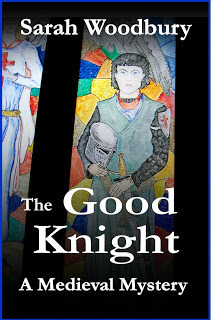
Today, I'm happy to announce a guest post by fellow historical novelist, Sarah Woodbury. I asked Sarah to tell us why she writes about medieval Wales and how the political intrigue there features in her books, including her latest release, a medieval mystery entitled The Good Knight.
*****
"Wales in the middle ages has been a focus of my research and passion as an anthropologist, writer, and amateur historian for the last ten years. One of the joys of working within this era is the extent to which history is stranger than fiction. Medieval Wales provides a wealth of opportunity for story-telling, with all the drama and excitement a novelist could want—without even having to make it all up.
The Good Knight is set against the backdrop of the rule of Owain Gwynedd, one of the most powerful and stable monarchs of north Wales in the middle ages. He was fortunate to have ruled during a time in which England, which had been trying to conquer Wales for a hundred and fifty years, was torn apart by the rivalry of two claimants to the throne: King Stephen and Empress Maud. Owain, in the fine tradition of Welsh royalty, took advantage of the strife in England to consolidate his rule and bring the other Welsh dynasties under his control.
In doing so, however, he engendered animosity among the other lords of Wales—and within his own family. With two wives, multiple mistresses, and a dozen sons, many of whom fought among themselves for power and favor, he created a legacy that would last until the death of Llywelyn ap Gruffydd at the hands of the English in 1282.
And made him a fulcrum of murder and mayhem in the middle ages."
*****
The Good Knight (A Medieval Mystery)
Intrigue, suspicion, and rivalry among the royal princes casts a shadow on the court of Owain, king of north Wales…
The year is 1143 and King Owain seeks to unite his daughter in marriage with an allied king. But when the groom is murdered on the way to his wedding, the bride's brother tasks his two best detectives—Gareth, a knight, and Gwen, the daughter of the court bard—with bringing the killer to justice.
And once blame for the murder falls on Gareth himself, Gwen must continue her search for the truth alone, finding unlikely allies in foreign lands, and ultimately uncovering a conspiracy that will shake the political foundations of Wales.
The Good Knight is available now at Amazon, Amazon UK and at
Smashwords.
Happy reading,
Gemi

Published on September 26, 2011 07:10
September 16, 2011
Artemis Rising, by Cheri Lasota
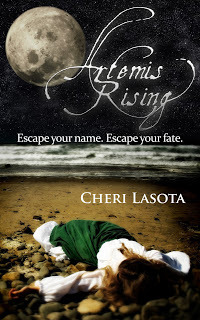
Myth and legend unite in Cheri Lasota's hauntingly beautiful debut novel, Artemis Rising. Even with such an intricate plotline, this book is a highly engaging read that will sweep you away with its lyrical passages.
The story begins as Eva's mother is mentoring her in the pagan rites of the goddess, Artemis. Eva takes the name of the water nymph, Arethusa, and thus consigns her fate to the myth surrounding the nymph, who was pursued by the river god, Alpheus. But Arethusa's father, a strict Catholic, discovers them and ships them off to the Azores. Soon, Arethusa finds herself the object of attention of the ship owner's son, the darkly handsome and possessive Diogo.
When a storm wrecks the ship, Arethusa awakens in the arms of her shy rescuer, the soft-spoken Tristao. Now parentless, Arethusa must suffer the derision of her fellow orphans. Diogo soon appears at her bedside and Arethusa begins to believe that he is her Alpheus.
Soon, another legend arises in Arethusa's life – the tragic romance of Tristan and Isolde. While struggling to unravel these two ancient tales and their often disturbing correlation to the events in her own life, Arethusa searches for the strength within herself to discover her own destiny.
While it's easy to get wrapped up in the myth and legend that Lasota has so skillfully laid out here, this book is surprising in both its depth and its message. It gets even more intense as it nears the end. The characters are solid and true. Most of all, Arethusa is a unique heroine of uncommon strength who will have you rooting for her all the way. Artemis Rising is a love story unlike any other, making it even more memorable.
Happy reading,
Gemi

Published on September 16, 2011 05:00
September 8, 2011
Saying Goodbye to Dragons
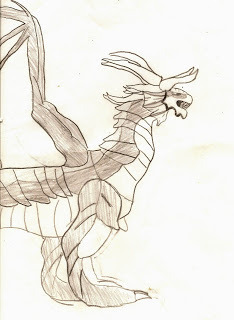
I have shamelessly stolen my son's artwork (from when he was about 14) for this blog post. I hope he won't mind, but I'll find out soon enough. When he was a Buddha-bellied tyke with a bowl haircut, he had a fascination with dinosaurs and dragons. So when we moved into our rat-infested, cob-webby house, which we had blindly bought at a sheriff's auction, I figured after emptying and gutting the place I'd decorate my kids' rooms in a way that was uniquely them. My daughter got a mural with blue sky and green rolling hills dotted with sheep and horses. In my son's room, I stenciled a chair rail border of 2" high green, fire-belching dragons.
Those tiny dragons were there for ten years. Until this past spring, when we discovered he had allergies. So we ripped out the carpet, put in new wood floors and I woefully painted over those dragons - all 68 of them. There was something very symbolic about the process. A rite of passage not only for my now 18-year old son, but for me, as well.
After we packed him off to college, friends would ask, "Don't you feel like an empty-nester? Miss your kids?" Well, yes... and no. He was so stoked about going, how could I possibly have regrets about it? People used to ask me something similar when we raised puppies and they went off to their new homes. "Aren't you sad to see them go?" Um, do you know how many piles of poop 10 8-week old puppies make on a daily basis? Okay, kids can be messy, but not in that way.
The point is, I know if I've planned my litter, socialized it and done my best to hold out for good homes, things are going to turn out just dandy. I'll get reports for years from beaming owners about the fabulous things their dogs have done. If I've raised my kids right and given them the good sense to be able to go out into the world and make their own way, it's actually kind of exciting to nudge them from the nest, see them take wing and know that in time they're going to be okay. They might even do good things and make me proud.
It's like that with writing books. I labor over them for years. Eventually though, I have to let them go. I'm about at that stage with another one. I alternate between feelings of apprehension and excitement. What if someone hates it? What if someone loves it so much they want to make a movie out of it? Part of me wants very fiercely to keep it to myself and stay safely connected to the characters so I can go on living in their world. But a bigger part of me knows there comes a time when I need to trust in the universe and share it with readers.
The difference between kids and books is that there's always another book to write. I've run out of kids. And I have so many more books to write...
Until later,
Gemi

Published on September 08, 2011 15:56
August 21, 2011
Places to find me (Facebook, Twitter, Past Times Books)

I've recently joined a group of fine Historical Fiction authors over at Past Times Books. These folks are a mixture of independently and traditionally published historical novelists who've banded together to offer readers a selection of quality historicals. So drop on by the Past Times Books web site and check them all out.
And you can finally find my author-self on Facebook! Setting up a fan page has been on my to-do list forever, but it kept getting bumped. A wonderful reader who'd just discovered one of my books went looking for me there and couldn't find me (guilty!), so there I am now, at long last. If you 'like' my page there, you'll get all the important updates, like upcoming releases, blog posts and book signings directly on your FB newsfeed. It's a bit bare at the moment, but I'll continue working on it. I promise to save my 'Pop-Tart failures' and 'Kindle accessorizing addiction admissions' for my Twitter babblings, but if you really want to know, you can find me there, too.
BTW, if you Tweet me, post on my FB wall or e-mail me (imgnr "at" imgnr "dot" com), I do write back. I LOVE hearing from readers! One reader recently mentioned how much they liked a certain character -who is now going to return in a sequel, just because of that.
Until later,
Gemi

Published on August 21, 2011 06:16



